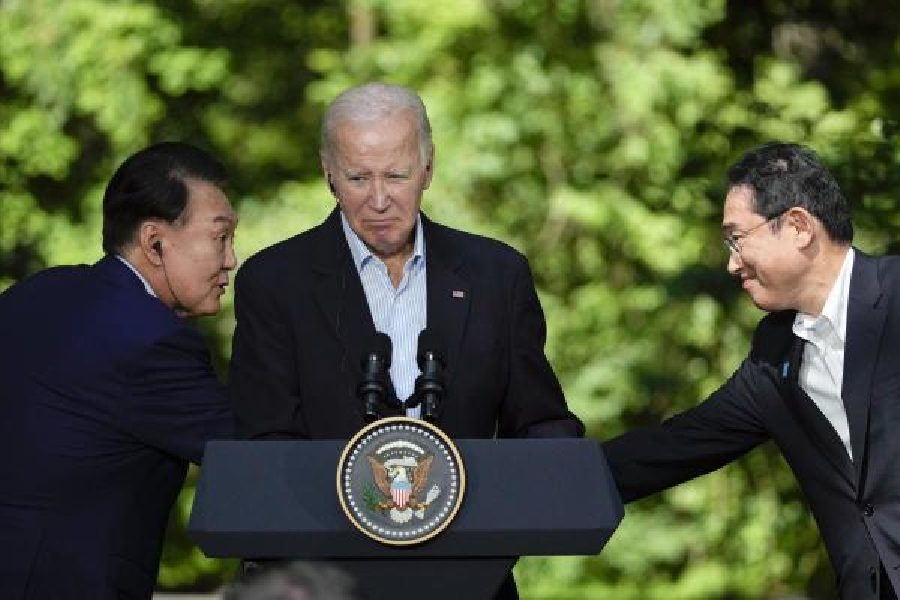Ever since members of the North Atlantic Treaty Organisation sprang into action to help Ukraine try to thwart Russia’s invasion last year, China has warned about a similar US-led security alliance forming in Asia that would seek to hobble Beijing’s ambitions and provoke a confrontation.
President Joe Biden’s Camp David summit on Friday with the leaders of Japan and South Korea most likely reinforces Beijing’s perception. The talks saw Japan and South Korea put aside their historical animosities to forge a defence pact with the US aimed at deterring Chinese and North Korean aggression.
Biden, who met with Prime Minister Fumio Kishida of Japan and President Yoon Suk Yeol of South Korea, sought to emphasise at a news conference that the summit was not “anti-China”. But Beijing will almost certainly find Biden’s assertion unpersuasive. China’s leader, Xi Jinping, has accused the US of leading Western countries in the “all-around containment, encirclement and suppression of China”.
“It is appropriate to say that the Camp David summit is possibly a starting shot for a new cold war,” Lu Chao, an expert on Korean Peninsula issues with the Liaoning Academy of Social Sciences, told the Communist Party newspaper, the Global Times, on Friday.
The Camp David agreement requires the US, Japan and Korea to hold annual talks, expand joint military exercises, and establish a three-way hotline for crisis communications. In a statement, the countries also criticised China’s “dangerous and aggressive behaviour” in the South China Sea and reaffirmed the “importance of peace and stability across the Taiwan Strait”.
The language on Taiwan, which could be read as a warning to Beijing not to attempt to take the island by force, will most likely rankle Chinese leaders for drawing Japan and South Korea closer into a dispute that has traditionally been restricted to the US, China and Taiwan. Just this week, China’s defence minister Li Shangfu visited Moscow and warned against “playing with fire” when it came to Taiwan. He added that any effort to “use Taiwan to contain China” would “surely end in failure”.
The Camp David agreement follows a string of moves by the Biden administration that Beijing views as hostile. Those include a clampdown on China’s access to advanced chip technology; a three-way security agreement with Australia and Britain; the strengthening of the so-called Quad grouping of the US, India, Australia and Japan; and an increased American military presence in the Philippines.
As the US, Japan and South Korea have drawn closer, China has responded largely by doubling down on the strategy that has been a source of concern to Washington and its allies in the region.
China has been holding joint military exercises with Russia, notably on Japan’s doorstep and near Alaska. It has pressed its claim over Taiwan with a steady increase of military pressure, including by launching a new round of air and naval drills on Saturday.
China has increasingly concentrated military drills on Taiwan’s east coast facing the Pacific Ocean as part of an “all-around encirclement” strategy aimed at demonstrating how the island can be choked off from outside help.
Beijing has often warned Tokyo and Seoul not to be drawn into the Taiwan issue, depicting Washington as a puppet master manipulating its allies. In an editorial on Wednesday, the Global Times likened South Korea to a “kindergarten child receiving a sticker from their teacher” by agreeing to attend the summit at Camp David.
China has also invoked ethnicity to try to drive a wedge between the sides. Last month, Wang Yi, the country’s top diplomat, warned Japan and South Korea that “no matter how yellow you dye your hair, or how sharp you make your nose, you’ll never turn into a European or American”.










